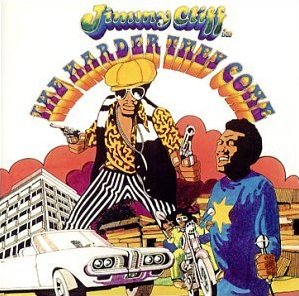
The Harder They Come is the soundtrack album to the film of the same name, released in 1972 in the United Kingdom as Island Records ILPS 9202. It was issued in February 1973 in North America as Mango Records SMAS-7400. It peaked at No. 140 on the Billboard 200. In 2021, the album was deemed "culturally, historically, or aesthetically significant" by the Library of Congress and selected for preservation in the National Recording Registry.
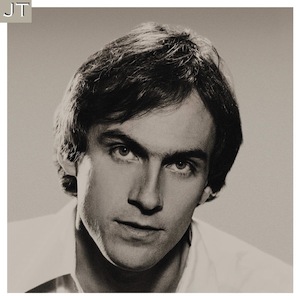
JT is the eighth studio album by American singer-songwriter James Taylor. It was released on June 22, 1977, via Columbia Records, making it his first album released for the label. Recording session took place from March 15 to April 24, 1977, at The Sound Factory in Los Angeles with Val Garay. Production was handled by Peter Asher.

Beautiful Loser is the eighth studio album by American rock artist Bob Seger, released in 1975. This album marked Seger's return to Capitol Records after a four-year split. His previous record with Capitol was Brand New Morning in 1971.

Blood & Chocolate is the eleventh studio album by the British rock singer and songwriter Elvis Costello, released in the United Kingdom as Demon Records XFIEND 80, and in the United States as Columbia 40518. It is his ninth album with his long-standing backing band known as 'The Attractions'. After his previous album King of America with producer T-Bone Burnett and different musicians, this album reunited him with producer Nick Lowe and his usual backing group the Attractions. It peaked at No. 16 on the UK Albums Chart, and No. 84 on the Billboard 200. In The Village Voice's annual Pazz & Jop critics poll for the year's best albums, Blood & Chocolate finished at number 9. The album was also included in the book 1001 Albums You Must Hear Before You Die. In 2000 it was voted number 475 in Colin Larkin's All Time Top 1000 Albums.

Shoot Out at the Fantasy Factory is the sixth studio album by English rock band Traffic released in 1973. It followed their 1971 album The Low Spark of High Heeled Boys and contained five songs. Shoot Out, while achieving poorer reviews than its predecessor, did reach number six on the Billboard Pop Albums chart, one space higher than Low Spark had peaked in 1972. Like its predecessor, the original jacket for the Shoot Out LP had its top right and bottom left corners clipped. The album was remastered for CD in 2003.

Marcus Garvey is the third album by reggae artist Burning Spear, released in 1975 on Fox Records in Jamaica and then internationally on Island Records later in the year. The album is named after the Jamaican National Hero and Rastafari movement prophet Marcus Garvey. A dub version of it was released four months later as Garvey's Ghost.

Metamorphosis is the third compilation album of the Rolling Stones music released by former manager Allen Klein's ABKCO Records after the band's departure from Decca and Klein. Released in 1975, Metamorphosis centres on outtakes and alternate versions of well-known songs recorded from 1964 to 1970.
James Eddie Lewis was an American soul singer, songwriter, arranger and producer. He was a member of the Drifters in the 1960s, worked as a songwriter and producer with Ray Charles, and wrote songs for Z. Z. Hill among many others.

Whistle Rymes is the second solo studio album by English rock musician John Entwistle, released on 3 November 1972 by Track Records in the UK and on 4 November 1972 by Decca Records in the US. Entwistle co-produced the album with John Alcock, his first work with a producer after self-producing his debut studio album, Smash Your Head Against the Wall (1971), and it was recorded at Island Studios in West London's Notting Hill district. The album features guitar contributions from both Peter Frampton and Jimmy McCulloch.
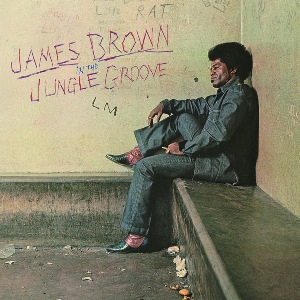
In the Jungle Groove is a compilation album by American funk musician James Brown, released in August 1986 by Polydor Records.
"Honky Tonk" is an instrumental written by Billy Butler, Bill Doggett, Clifford Scott, and Shep Shepherd. Doggett recorded it as a two-part single in 1956. It became Doggett's signature piece and a standard recorded by many other performers.

A Possible Projection of the Future / Childhood's End is American musician Al Kooper's fifth album, recorded for and released by Columbia Records in 1972.

Crash Landing is a posthumous compilation album by American guitarist Jimi Hendrix. It was released in March and August 1975 in the US and the UK respectively. It was the first Hendrix album to be produced by Alan Douglas.
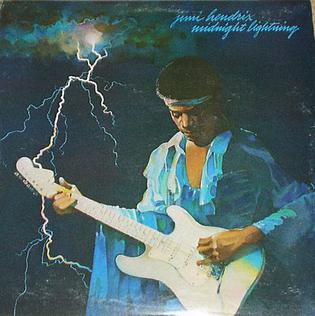
Midnight Lightning is a posthumous compilation album by American rock guitarist Jimi Hendrix. It was released in November 1975 by Reprise Records in the US and Polydor Records in the UK. It was the second to be produced by Alan Douglas and Tony Bongiovi and contains demo-type recordings that were overdubbed with musicians who had never played with Hendrix. Despite including reworkings of the popular live songs "Hear My Train" and "Machine Gun", the album was not as well received as its predecessor, peaking at numbers 43 in the US and 46 in the UK.
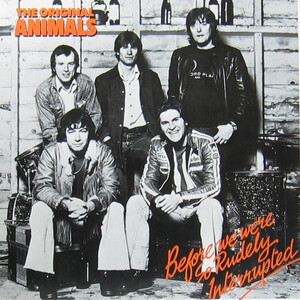
Before We Were So Rudely Interrupted is a 1977 reunion album by the Animals. They are billed on the cover as the Original Animals.
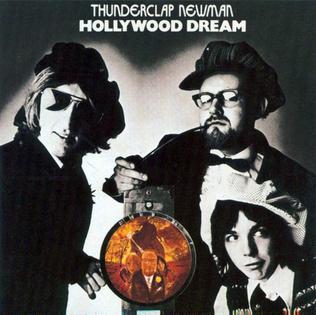
Hollywood Dream is the only studio album by British rock band Thunderclap Newman.

Black Caesar is a soundtrack album recorded by James Brown for the film of the same name and released in 1973. The album also features The J.B.'s and Lyn Collins.

On the Road Again is the third solo album by Roy Wood. The album was released only due to the intervention of Warner Bros. boss Mo Ostin, but it was only released in the United States, Germany and the Netherlands. The album includes guest appearances from Carl Wayne, Andy Fairweather-Low and John Bonham.

Doing His Thing is a 1969 studio album by Ray Charles, released by Tangerine Records. The cover artwork was by Lafayette Chew.

"Trapped" is a 1972 song written and recorded by reggae artist Jimmy Cliff and popularized by Bruce Springsteen in the 1980s.


















